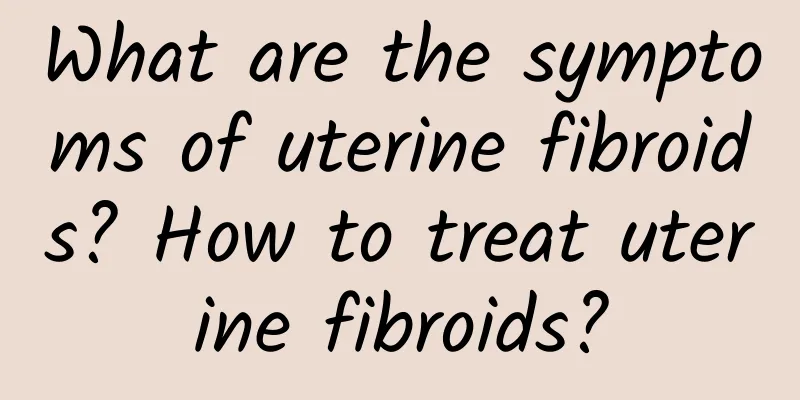What are the symptoms of uterine fibroids? How to treat uterine fibroids?

|
Uterine fibroids are a very common gynecological disease. Many female friends hear that the color of the "tumor" has changed and think that they have a serious disease, that is, fear and disappointment, and do not know how to face it. In fact, uterine fibroids are a benign lesion of the uterine grass tissue. As long as they do not cause cancer, they have no serious impact on health. As long as female friends understand the causes and conditions of uterine fibroids, they can block their growth pattern in their daily lives. 1. What is the cause of uterine fibroids? Uterine fibroids are a type of tumor that depends on estrogen for growth. They usually occur between the ages of 30 and 50, especially in high-estrogen environments such as pregnancy and exogenous high estrogen. Fibroids gradually decrease after menopause. 2. What are the symptoms of uterine fibroids? Depending on the size and location of the fibroid, there may or may not be symptoms. It can be detected by gynecological examination or B-ultrasound. The main symptom is uterine bleeding, which manifests as increased menstrual flow or irregular periods. Another major symptom of uterine fibroids is compression. The enlarged uterus presses the bladder forward, causing frequent urination and difficulty urinating, and can compress the rectum backward, manifesting as constipation or difficulty defecating. Sometimes there is abdominal pain. Do uterine fibroids require surgery? This depends on where the fibroids grow and the severity of the complications. In most cases, uterine fibroids do not require surgery. If they grow at the entrance of the fallopian tube, it will affect conception and surgery is required to remove the fibroids. Some fibroids grow on the side of the uterus or protrude from the surface of the uterus. Some are indistinguishable from ovarian tumors and surgical removal is recommended. Some fibroids can cause ascites and pleural effusions, which also require surgery. |
<<: What should I do if I have uterine fibroids? What are the symptoms of uterine fibroids?
>>: Are the symptoms of uterine fibroids complicated? Can uterine fibroids be felt by hand?
Recommend
What should be paid attention to when treating pelvic peritonitis
Pelvic peritonitis is a common gynecological dise...
How much does it cost to treat pelvic peritonitis?
Because the female pelvic cavity contains many ti...
How do uterine cysts form?
How do uterine cysts form? Under normal circumsta...
Sweet potatoes are high in fiber and low in calories, making them the best detoxifying food! Eat cinnamon baked sweet potatoes to help with bowel movements and weight loss
When it comes to weight loss products, sweet pota...
How many types of ovarian cysts are there?
The ovary is the place where a woman gives birth ...
What are the dangers of menstrual disorders
Menstrual irregularities can have many adverse ef...
How to prevent ovulation bleeding
How to prevent ovulation bleeding? There are many...
Four common symptoms of irregular menstruation
How much do you know about the symptoms of irregu...
Note: Bad living habits can cause irregular menstruation in women
Irregular menstruation is the most common gynecol...
What should women do if they have irregular menstruation? Here are five ways to help you easily regulate irregular menstruation.
Menstruation is something that women need to pay ...
What prenatal tests are needed to prepare for pregnancy after missed abortion?
After a missed miscarriage, planning another preg...
4 low-calorie healthy snacks with olives that are sweet and good for your stomach
During the Chinese New Year reunion party, it is ...
What are the symptoms of early cervical erosion? Early cervical erosion is common in these manifestations
If a woman unfortunately suffers from a gynecolog...
Experts explain the important postoperative care of adnexitis
Patients with adnexitis will be weak after receiv...
How to treat high prolactin? What should we pay attention to in daily life?
How to treat high prolactin? This is a question w...









